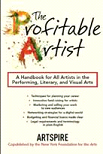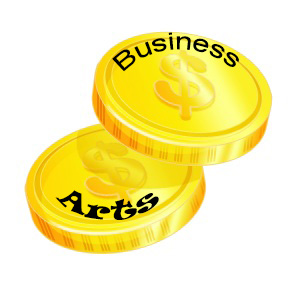Developing a sense of financial health is just as important as developing one’s physical and emotional health. In fact, one could say that creating a financially healthy environment will contribute greatly to an artist’s long-term emotional and physical health.
 Recently, Don Marrazzo, Executive Director at Astral Artists, a successful Philadelphia-based management company, and I were discussing the challenges of young performing artists. We met in the exhibit area of the recently concluded annual Chamber Music America conference held at the Westin Hotel (New York City). For about 30 minutes we decried the unrealistic expectations and lack of business acumen on the part of younger performers.
Recently, Don Marrazzo, Executive Director at Astral Artists, a successful Philadelphia-based management company, and I were discussing the challenges of young performing artists. We met in the exhibit area of the recently concluded annual Chamber Music America conference held at the Westin Hotel (New York City). For about 30 minutes we decried the unrealistic expectations and lack of business acumen on the part of younger performers.
Given my own multi-decades of experience in the performing arts, and especially my direct experience with jazz and classical musicians, I have become used to the fact that practitioners of the fine and performing arts, i.e., those writing, painting, sculpting, composing, playing, and dancing, seemed to lack even the most basic understanding of the business side of the arts. The image of the “starving” or at least the “poor” artist, as portrayed in such works as the opera “La Boheme” and a slew of stories, films, documentaries, and television programs, is no mere fictional presentation. Artists of many stripes—except those few at the very top of the creative food chain—do not make enough money (see the results compiled by the Future of Music Coalition) to truly enjoy the financial rewards of their art.
 Paradoxically, opportunities to learn about the “business” side of the fine and performing arts, however, are not lacking. The aforementioned Chamber Music America offers a series of “professional development” seminars called “First Tuesdays” each fall and spring at Saint Peter’s Church in New York City. There’s the summer “Bootcamp” sponsored by the New York Foundation for the Arts. (See my April 8, 2012 blog for details on this program). This same organization also published a book in 2012 entitled The Profitable Artist.
Paradoxically, opportunities to learn about the “business” side of the fine and performing arts, however, are not lacking. The aforementioned Chamber Music America offers a series of “professional development” seminars called “First Tuesdays” each fall and spring at Saint Peter’s Church in New York City. There’s the summer “Bootcamp” sponsored by the New York Foundation for the Arts. (See my April 8, 2012 blog for details on this program). This same organization also published a book in 2012 entitled The Profitable Artist.
Several colleges and universities offer professional development programs. For example, in the area of music there’s the Center for Music Entrepreneurship at the Manhattan School of Music (New York City). Berklee College (Boston) also offers courses in the “music business,” with such offerings as “Music Business 101,” “Music Publishing,” “Concert Touring,” and “Online Music Marketing.” Other colleges offering music business courses of study include: Loyola University (New Orleans), the University of Memphis (Memphis, TN), New York University (New York), Drexel University (Philadelphia), and Full Sail University (Winter Park, FL). At Baruch College (The City University of New York), the Department of Fine and Performing Arts offers a major entitled “The Management of Musical Enterprises.” This list is not exhaustive.
 There’s no doubt colleges and universities offering courses—other than liberal arts prerequisites—in the fine and performing arts have stepped up to the plate with business-oriented courses in response to the growing need for practitioners in these artistic disciplines to have some modicum of understanding of the business side of the “arts” coin.
There’s no doubt colleges and universities offering courses—other than liberal arts prerequisites—in the fine and performing arts have stepped up to the plate with business-oriented courses in response to the growing need for practitioners in these artistic disciplines to have some modicum of understanding of the business side of the “arts” coin.
Yet, with all these “educational opportunities” that have sprung up in various parts of the United States, why is it that so many artists, particularly musicians, are still having a hard time making economic ends meet?
There are many reasons, some global, some individual. On the global side, there’s too much supply of talent chasing too few, or perhaps I should say, an apparent shrinking number of “arts” opportunities with any kind of economic heft.
Second, while there are certainly numerous opportunities for “free” education, such as the “First Tuesdays” offered by Chamber Music America, to earn a Master of Arts in Music Business degree from New York University costs $42,676 a year—and it’s a multi-year program. How many musicians already saddled with education loans from a bachelor’s degree can afford this degree?
Third, there’s the matter of time. If you’re an artist struggling to earn a living, how much time will you have to stop working or creating to pursue a degree?
Fourth, not everyone is as business-savvy as they are “creatively inclined.” And even if the artist has a good business sense, there are still going to be those who are “fleeced” by more business-educated individuals.
These issues aside, there’s a central problem with all the higher education, foundation, and association professional development courses and seminars. They deal on a macro-level. While there are hundreds (probably thousands) of books, newspaper, magazine, and online articles dealing with DIY this and DIY that, none of these help yourself educational opportunities deals with a far more fundamental and central issue: an understanding and acceptance of financial issues on a very personal level.
If an artist is not given the opportunity to both understand and accept the need for personal attention to financial matters of several kinds at a young age, it is probable that that artist is going to have financial problems later in life, regardless of gender.
 What kind of financial matters am I referring to? Developing multiple revenue streams, long-term savings, long-term investments, the difference between a personal checking account and a business checking account, having a checking account in the first place, maintaining a good/excellent credit rating, having access to a good lawyer, having access to a good accountant, arranging for health insurance, arranging for disability insurance, arranging for life insurance, paying taxes on time, keeping good personal financial records, reading contracts, making sure there is a contract, developing a personal budget, developing a periodic net worth statement, creating financial goals, reviewing those goals quarterly and annually, wills, health care proxies, power of attorney, and so on.
What kind of financial matters am I referring to? Developing multiple revenue streams, long-term savings, long-term investments, the difference between a personal checking account and a business checking account, having a checking account in the first place, maintaining a good/excellent credit rating, having access to a good lawyer, having access to a good accountant, arranging for health insurance, arranging for disability insurance, arranging for life insurance, paying taxes on time, keeping good personal financial records, reading contracts, making sure there is a contract, developing a personal budget, developing a periodic net worth statement, creating financial goals, reviewing those goals quarterly and annually, wills, health care proxies, power of attorney, and so on.
External economic forces notwithstanding, often an artist fails financially because the artist did not pay enough attention to personal financial matters. It is my impression that for many artists dealing with financial matters is so anathema to their personality and temperament, no effort will make a difference. The issue is highly emotional. Some artists perceive that dealing with financial issues is tantamount to giving up their aesthetic values. This is, of course, nonsense, and just a way of avoiding reality and practical matters.
Please write to me at meiienterprises@aol.com if you have any comments on this or any other of my blogs.
Eugene Marlow, Ph.D.
January 28, 2013
©Eugene Marlow 2013


